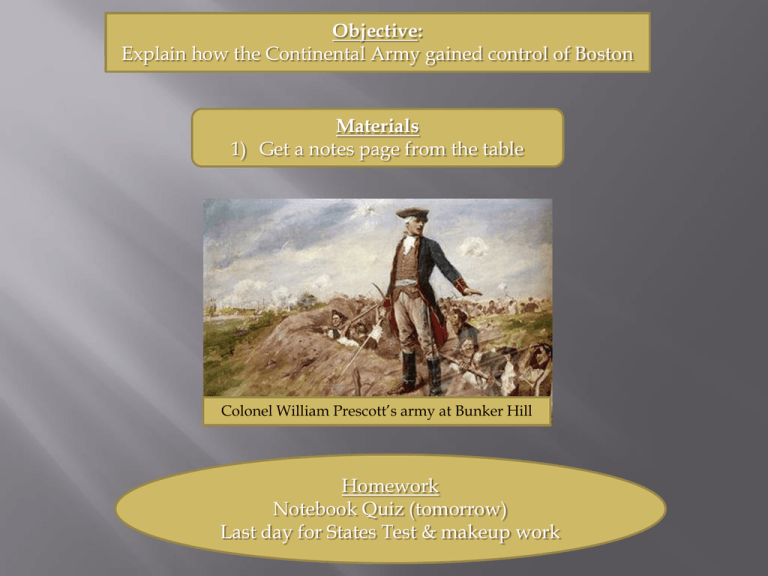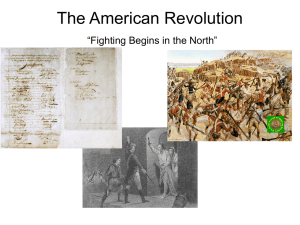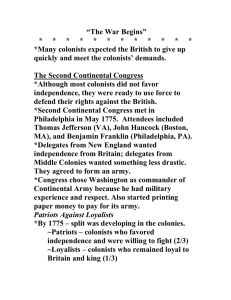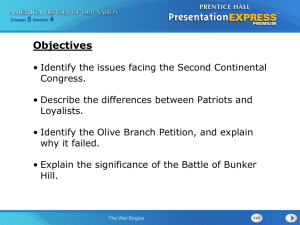Bunker Hill
advertisement

Objective: Explain how the Continental Army gained control of Boston Materials 1) Get a notes page from the table Colonel William Prescott’s army at Bunker Hill Homework Notebook Quiz (tomorrow) Last day for States Test & makeup work Within a few days of Lexington and Concord, between 10,000 and 15,000 militia rushed to Boston. They surrounded the city and the British troops stationed there. On May 10, 1775 (a few weeks after Lexington and Concord), colonial delegates met at the Second Continental Congress in Philadelphia. Most hoped to avoid a break with Britain, however, while at the meeting, the fighting spread. The delegates decided to send a petition to King George. In the Olive Branch Petition, they declared their loyalty to the king and asked him to repeal the Intolerable Acts. The king was furious about the petition and ordered 20,000 more troops to the colonies to crush the revolt. Ethan Allen (a Vermont blacksmith) decided to lead a band of Vermonters known as the Green Mountain Boys in a surprise attack on British Fort Ticonderoga. Allen knew the fort held cannons that the colonists could use. Allen and his men were successful in capturing the fort and gave the colonists a valuable supply of cannons and gunpowder. In June of 1775, the Second Continental Congress set up the Continental Army. They appointed George Washington of Virginia as commander. The colonists who favored war against Britain called themselves Patriots These men entered the war with many disadvantages: Poorly organized and untrained. Few cannons little gunpowder & no navy Also had some advantages: Owned rifles and were good shots Determined to fight to defend their homes & property. The British were a powerful foe Highly trained, experienced troops. Their navy was the best in the world. Britain also faced some problems: Its armies were 3,000 miles from home. News and supplies took months to travel from Britain to America. British soldiers risked attacks from colonists in the countryside. American colonists who remained loyal to Britain were called loyalists There were more loyalists in the Middle & Southern Colonies than in New England. Patriots tarred & feathered Loyalists during the war. During the 1st year of conflict, much of the fighting centered around Boston The British prevailed, but more than 1,000 British troops lay dead or wounded. On June 16, 1775, Colonel William Prescott led 1,200 minutemen up Bunker Hill, across the river from Boston. Battle of Bunker Hill was the 1st major battle of the Revolution. They could fire on British ships in Boston harbor. Prescott noticed that nearby Breed’s Hill was better so he ordered his men to move there. British General William Howe ordered 2,400 redcoats to attack the hills. After Bunker Hill, General Washington found 16,000 troops camped in huts and tents near Boston. He quickly started to train the men and turned them into an army. In January 1776, the cannons from Fort Ticonderoga arrived in Boston so General Washington had the cannons placed on elevated land, overlooking the Boston Harbor. British General Howe had his men sail from Boston to Canada in March of 1776 to avoid being killed by the colonists. King George III ordered a blockade of all colonial ports and also used mercenaries (troops for hire), from Germany to help fight the colonists. As you are watching the video clip…write down 5 things that are important in the Battle of Bunker Hill






